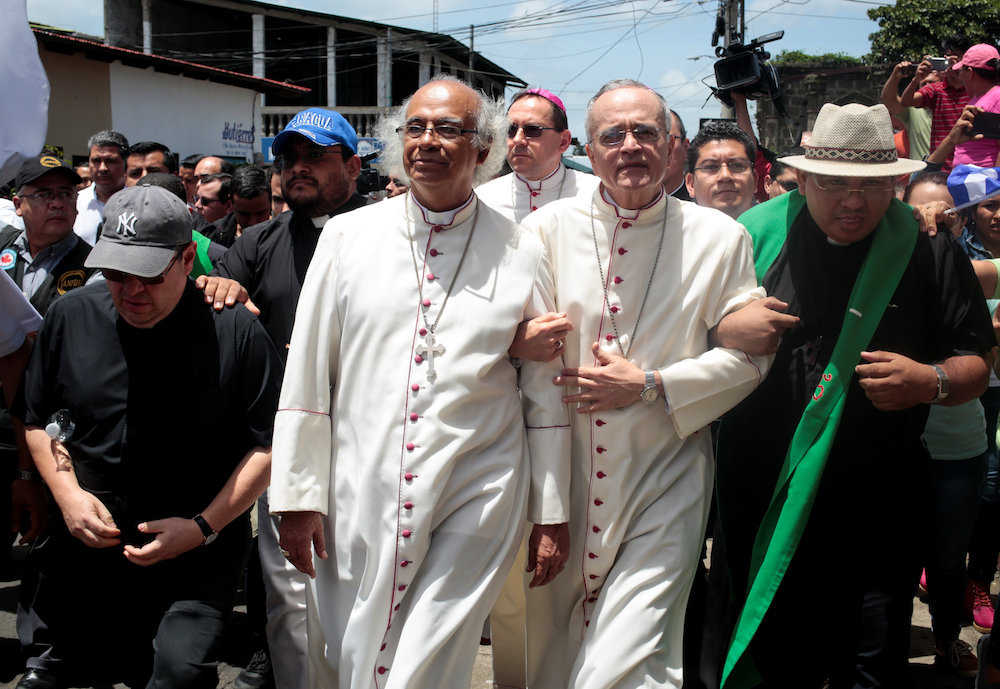As the political and social situation in Nicaragua continues to be unstable, the government of President Daniel Ortega is reportedly forcing public employees to sign a petition addressed to the Vatican to denounce an auxiliary bishop for staging a coup.
“Those signing below subscribe to the letter to Pope Francis dated Oct. 24, 2018, regarding Bishop Silvio Baez, whose instigation of violence and disunion doesn’t correspond with the pastoral work proper to his position,” reads the letter that teachers and employees of public educational centers were pressured to sign, according to the local news site 100 Percent News.
Baez is the auxiliary bishop of Managua, the country’s capital, and according to pro-government news outlets, there are audio recordings of him urging a coup to bring down Ortega and his wife, Vice President Rosario Murillo.
The prelate was accused of “conspiring to destabilize the government of Daniel Ortega.” In response, the president’s son, Laureano Ortega, has called the bishop a “murderer coup-monger.”
Cardinal Leopoldo José Brenes, the Archbishop of Managua, came out in Baez’s defense through a statement released last week, in which he urged priests and the faithful of the diocese to “continue praying for the Church, asking God for the strength to continue fulfilling his mission.”
The statement also said the cardinal has been in touch with Baez to express his “closeness, prayer and support.” Baez made his own statement on Twitter.
“I thank from the heart those who’ve shown their closeness and prayers,” Baez said.
“My conscience doesn’t reproach me for anything in front of God. With his strength, I will continue in Nicaragua the ministry that the Church has entrusted me with the awareness that the ‘word of God is not in shackles’,” he wrote soon after the attacks began last week.
Over the weekend, several Catholic priests and bishops spoke out against the government, including Baez himself, who said in his Sunday homily, “The disciples of Jesus must tell the people to stand up like the blind man who was asking to regain his sight, even if circumstances and evil things dominate the situation.”
Baez cited the words of Pope Francis at the end of the Oct. 3-28 Synod of Bishops in Rome by tweeting: “We’re being strongly accused, and this accusation also becomes persecution. Persecutions, like the ones in the [Middle] East, and other places. But also there’s another kind of persecution [in the form of] constant accusations to dirty the Church.”
On Sunday, in the cathedral of Managua, Father Silvio Romero dedicated his homily to the crisis, quoting recently canonized Archbishop Oscar Arnulfo Romero, of El Salvador, who was declared a saint by Pope Francis during the synod.
“This is not a problem between the government and the Church, it’s a problem between the government and the people. In this situation, the Church is with the people and the people is with the Church,” said Romero.
The clash between the Church and the government in Nicaragua is unfolding amidst a crisis which, according to humanitarian agencies, has left between 325 and 528 dead and over 500 political prisoners. The government only recognizes 199 victims and 200 inmates whom it regards as “terrorists” and pro-coup.
The Romero homily quoted by Baez was a reflection on Sunday’s Gospel reading from Mark.
On his way to Jerusalem, Jesus stops when he hears the plea of Bartimaeus, a blind beggar who was lying on the side of the road. Instead of sending one of his disciples, Jesus goes to him, asks what his needs are and listens to him, before performing a miracle that allowed the homeless man to regain his sight.
Romero suggested those who are “blind” need first to acknowledge they are blind; then to identify if their blindness is spiritual, moral, ideological or political; to listen to the voice of God; to obey it; not to allow themselves to be dragged towards darkness; and, finally, to dialogue with Christ.
Relations between the government and the Church in Nicaragua, which have been tense since April, took a turn for the worse in early July when a group aligned with the government physically attacked several bishops who, serving as mediators in a national dialogue to overcome the crisis, had requested Ortega to move up the national elections set for 2021.
The ongoing crisis in Nicaragua exploded on April 18 after the government tried to implement a social security reform that led thousands to take to the streets in protest. In the end the reforms were never put into effect, but that hasn’t stopped the civil unrest.

